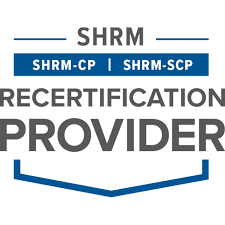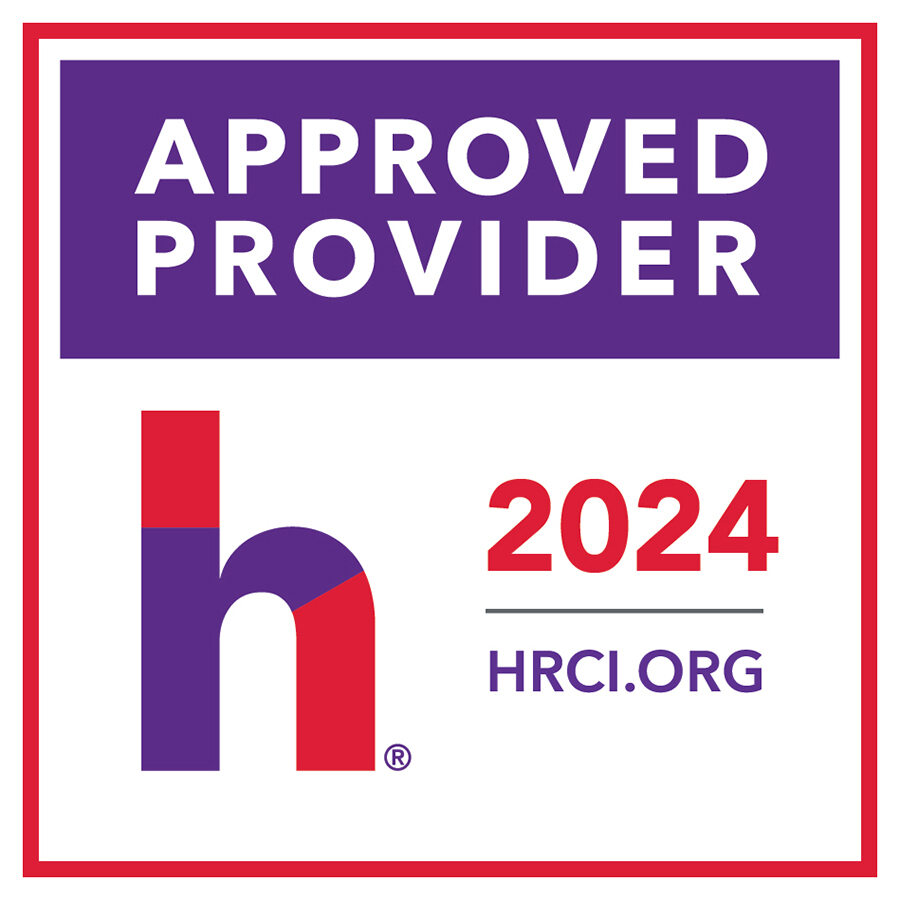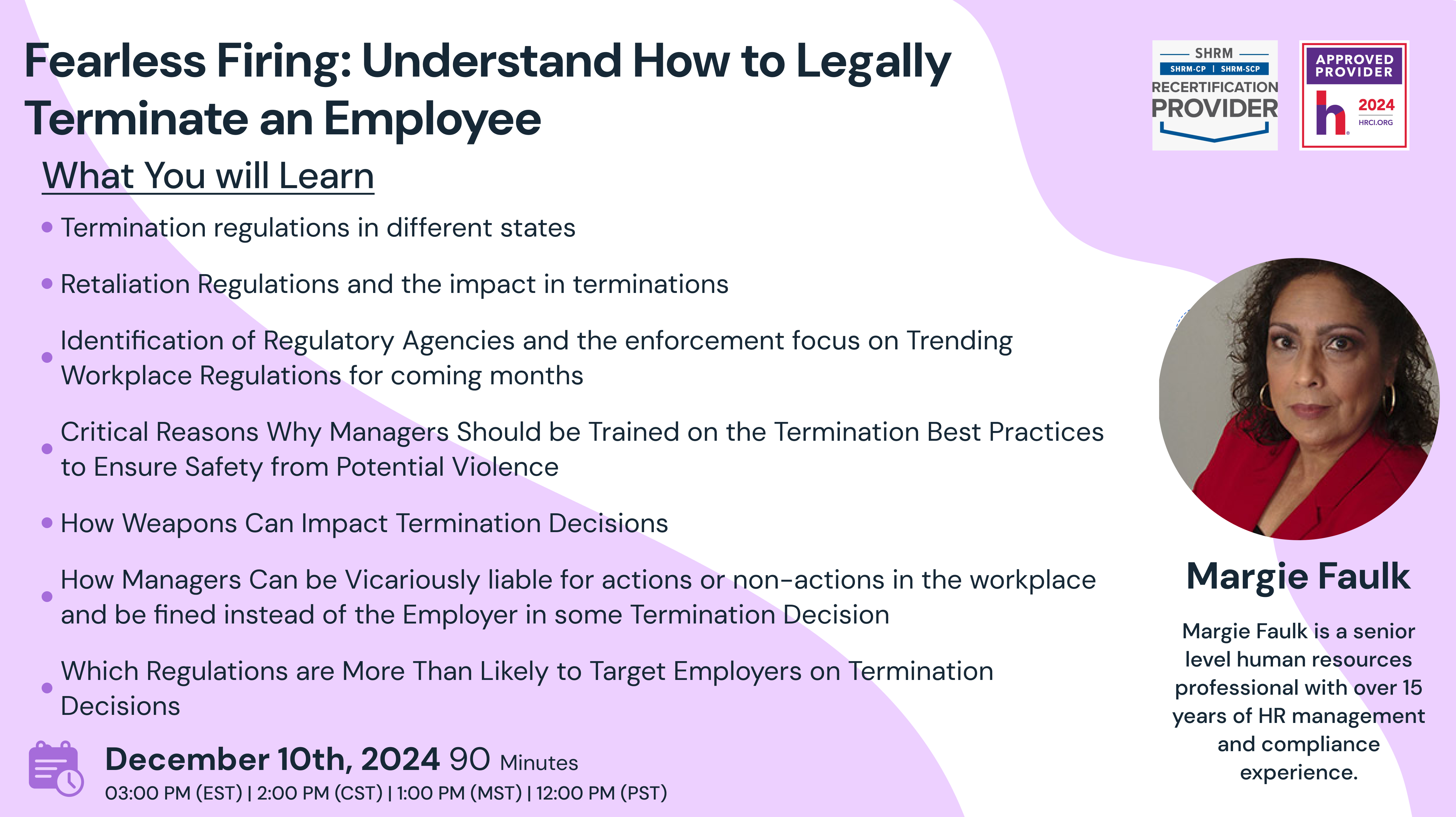Legally Terminating an Employee in 2025
Employers have always avoided the termination either because it is not easy to terminate someone or because it can be difficult to defend any allegations of wrongful termination. Cases of wrongful termination have emerged and increased since the late 2000 year. Research has identified the following factors in this increase:
Employees more aware and knowledgeable of the workplace rights Employees taking chances in making “a killing” by charging discrimination Equal Employment Opportunity Commission (EEOC) establishing increased awareness on how employees can make these charges New whistleblower protections for employees who turn in Employers More resources on websites by Department of Labor (DOL) providing employees with ways to confirm if Employers are violating current regulations.
Because of these and other factors, Employers are now more than ever, at risk of litigation against termination decisions. The EEOC has established definitions and guidelines of what constitutes discrimination and what employees are part of “protected classes” and discrimination claims. Now that there have been additional protections under EEOC, Employers should consider these regulations and prepare for those potential Risks.
Employers need to be aware of the cost of these actions via litigation, fines & penalties and even criminal sanctions. Employers need to ask if they have the protections they need when they make decisions on termination, reduction in force, demotion, suspensions and disciplinary actions.
What We will Discuss
- Termination regulations in different states
- Retaliation Regulations and the impact in terminations
- Identification of Regulatory Agencies and the enforcement focus on Trending Workplace Regulations for coming months
- Critical Reasons Why Managers Should be Trained on the Termination Best Practices to Ensure Safety From Potential Violence
- How Weapons Can Impact Termination Decisions
- How Managers Can be Vicariously liable for actions or non actions in the workplace and be fined instead of the Employer in some Termination Decision
- Which Regulations are More Than Likely to Target Employers on Termination Decisions
What You will Learn
- Learn how employees should be terminated with dignity respect and within regulations
- Learn how to mitigate wrongful termination allegations before they happen Create a termination checklist that will reduce your risk when making a decision to terminate
- Gain knowledge of the EEOC regulations and guidelines to prevent allegations of discrimination or wrongful termination
- Create a policy that will assist managers in terminating employees without fear of retribution from the regulatory agencies and employees
- Use training of your managers to reduce your risk since you can be held liable for Managers/Supervisors with bad management and poor judgment in handling employees
- Teach Managers how to document performance issues in preparation for
- Develop a termination process that will ensure consistency, fairness, objectivity and reduce risks
- Learn what factors can be an obstacle in ensuring a worry free termination process
- Learn how to handle volatile terminations including employees who own we@pons, have history of aggressive behavior, domestic vio!ence, sexu@l ass@ult or stalking, harassment, mental illness and other behavior issues that can pose a risk to Managers and employees
- Learn how Retaliation regulations need to be addressed before terminating an employee
Who Should Attend
- Human Resources Professionals
- Employers
- Managers
- Supervisors
- Executives Compliance professionals
- Business owners
- Professionals who handle employee relations issues

Margie Faulk
Margie Faulk is a senior level human resources professional with over 15 years of HR management and compliance experience. A current Compliance Advisor for HR Compliance Solutions, LLC, Margie, has worked as an HR Compliance advisor for major corporations and small businesses in the small, large, private, public, Non-profit sectors and International compliance. Margie has provided small to large businesses with risk management strategies that protect companies and reduces potential workplace fines and penalties from violation of employment regulations. Margie is bilingual (Spanish) fluent and Bi-cultural. Margie’s area of expertise includes Criminal Background Screening Policies and auditing, I-9 document correction and storage compliance, Immigration compliance, employee handbook development, policy development, sexual harassment investigations/certified training, SOX regulations, payroll compliance, compliance consulting, monitoring US-based federal, state and local regulations, employee relations issues, internal investigations, HR management, compliance consulting, internal/external audits, and performance management. Margie’s unique training philosophy includes providing free customized tools for all attendees. These tools are customized and have been proven to be part an effective risk management strategy. Some of the customized tools include the I-9 Self Audit. Correction and Storage program, Ban the Box Decision Matrix Policy that Employers can provide in a dispute for allegations, Family Medical Leave Act (FMLA) Compliance Guide, Drug-Free Workplace Volatile Termination E-Book and other compliance program tools when attendees register and attend Margie’s trainings. Margie holds professional human resources certification (PHR) from the HR Certification Institution (HRCI) and SHRM-CP certification from the Society for Human Resources Management. Margie is a member of the Society of Corporate Compliance & Ethics (SCCE).

SHRM -
StandEagle is recognized by SHRM to offer Professional Development Credits (PDCs) for the SHRM-CPSM or SHRM-SCPSM. This program is valid for 1.5 PDCs for the SHRM-CPSM or SHRM-SCPSM. For more information about certification or recertification, please visit - portal.shrm.org.

HRCI -
This webinar has been approved for 1.5 HR (General) re-certification credit hours toward California, GPHR, HRBP, HRMP, PHR, and SPHR recertification through the HR Certification Institute.
The use of this seal is not an endorsement by the HR Certification Institute of the quality of the activity. It means that this activity has met the HR Certification Institute’s criteria to be pre-approved for re-certification credit.

ACCREDITATIONS


